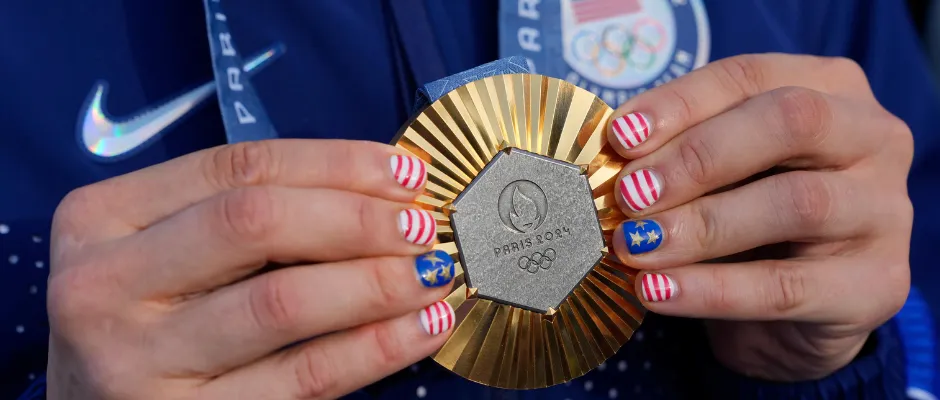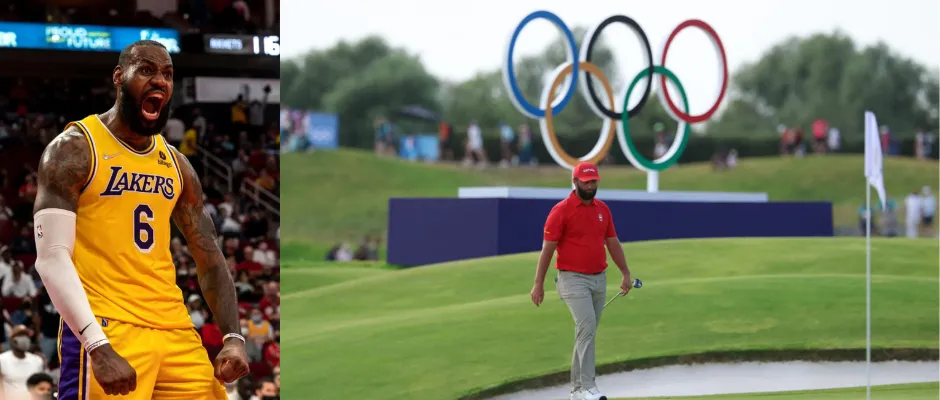Keywords:
olympic athletes; cash prize for the Paris 2024 Olympics; cash prize for athletics and boxing; income disparities among Olympic athletes; relevant keywords:
federation to award prize
national Olympic committees
Summer Olympic Games
committed to expanding
international federation to award
2.4 million
World Athletics announced
revenue allocation
president of World Athletics, Sebastian Coe
Olympic and Paralympic Committee
International Olympic Committee
award cash prize
governing body of athletics
48 athletics
olympic athletes
silver and bronze medalists
athletics events
Paris 2024 Olympics
money in an Olympic edition
athletes receive
At the Paris Games, athletes in boxing and athletics events will not only receive medals but also substantial cash prizes. These cash prizes aim to reward athletes for their dedication and achievements. This decision has sparked a wide debate on the best way to distribute the wealth generated by the Olympics and highlighted significant disparities in how different sports and athletes are compensated.
Evolution of the Modern Olympics
Since the modern Olympics began in Athens in 1896, the Games were strictly amateur, with no professional athletes and no cash prizes. Athletes competed purely for the honor and glory of representing their countries. The evolution of the Olympic Games has led to a complex financial landscape where revenue sources for athletes in Olympic sports are diverse, including sponsorships, financial rewards from their countries, and, for the first time, cash prizes directly tied to Olympic victories.
Introduction to Cash Prize
In April 2023, World Athletics announced that gold medalists in athletics at the Paris 2024 Olympics would receive $50,000. This announcement marked a significant shift in how Olympic success is financially rewarded. A month later, the International Boxing Association (IBA) declared that gold medalists in boxing would receive $100,000. However, a quarter of that amount would go to the athlete's national boxing association, and another quarter would be allocated to their coach.
The cash prize structure has evolved since the Tokyo Olympics, where financial rewards varied significantly by country and were often less substantial. Silver and bronze medalists will receive smaller amounts; in boxing, even the top five finishers will receive some financial reward. However, this cash prize does not come directly from the Olympic organizers but from the governing bodies of these two sports. World Athletics is using part of the funds it receives from the International Olympic Committee (IOC), which constitutes a portion of the Olympic revenue previously allocated for broader athlete development. This reallocation has raised questions about whether awarding cash prizes is the best use of these funds. The source of the cash prize in boxing remains somewhat opaque, and the IBA has been criticized for a lack of financial transparency.
The Controversy Over Cash Prizes at the Paris 2024 Olympics
Dr. Tom Bason from the International Centre for Sports Business at Coventry University believes that directing cash prizes to winners may reinforce the notion that top athletes are paid to compete. Athletes in athletics, for example, often face financial struggles, with many earning less than $50,000 a year from their sport, despite their dedication and success. Critics argue that this money could be better spent on developing young athletes rather than those already at the peak of their careers. The concern is that concentrating resources on established athletes may undermine the support necessary to nurture emerging talents.

However, some Olympic champions who have faced financial difficulties could significantly benefit from the additional income. For example, Soviet gymnastics legend Olga Korbut, who won four gold medals and two silvers, had to sell three of her medals in 2017 for $333,500 to survive. This example highlights that even the most successful athletes can face financial hardships after retirement, and the cash prize can provide a much-needed financial cushion.
National Prize Policies
In addition to the event-specific cash prize, many countries offer financial rewards to their Olympic medalists. These rewards vary widely by nation, reflecting different national policies and priorities. Singapore is known for being the most generous, granting $750,000 to each gold medalist, with significant amounts also allocated to silver and bronze medalists. This substantial amount aims to recognize and encourage top athletic performance.
The host nation France offers €80,000 for its gold medalists, while Morocco provides an even more impressive $200,000. In contrast, the United States awards $37,500 through its Operation Gold fund, with specific bonuses for silver and bronze medalists. Meanwhile, countries like the United Kingdom do not provide financial rewards directly tied to medal achievements. Instead, they offer support to athletes before the Olympics, focusing on funding their training and development. This approach aims to provide athletes with the necessary resources to succeed without creating financial incentives linked to specific outcomes.
Income Inequalities Among Olympic Athletes
The income disparity among Olympic athletes is significant and often glaring. According to Forbes' annual list of the highest-paid athletes, Spanish golfer Jon Rahm and American basketball star LeBron James are the top earners competing at the Paris 2024 Olympics. Rahm's estimated earnings last year were $218 million, largely from the Saudi Arabia-funded LIV Golf series, while James earned $128 million from his basketball career and various endorsements. Athletes who win gold often receive substantial financial rewards from their countries, with some nations offering significant monetary bonuses for gold medalists.

However, for lesser-known athletes, winning a medal can significantly increase their income, often through clauses in sponsorship agreements that grant bonuses for podium finishes. These clauses are typically confidential, but a 2016 legal dispute between Nike and New Balance revealed that American middle-distance runner Boris Berian would earn $150,000 from Nike if he won Olympic gold. This financial incentive structure highlights the importance of Olympic success for athletes who rely on these bonuses to supplement their income. Prominent athletes like Simone Biles and Michael Johnson, who won four gold medals, have also seen significant financial gains due to their Olympic successes.
“Many people see the top American athletes or international football players for European teams and assume that all athletes earn $100,000 or $200,000 a week, but that’s far from the truth,” says Dr. Bason. “Many athletes face financial hardships. A few years ago, a study in Australia found that 40% of athletes training for the 2032 Olympics had a part-time or full-time job.”
Even in the United States, home to some of the richest sports stars in the world, many Olympic athletes face financial challenges. A recent study by the United States Olympic and Paralympic Committee found that 26.5% of active athletes had an annual income below $15,000. This statistic underscores the significant financial pressures faced by many athletes who dedicate years of their lives to training and competing at the highest levels.
Future Changes
Each of the medals at the Paris 2024 Olympics contains a small piece of iron from the Eiffel Tower, symbolizing a unique connection to the host city. Despite the controversy surrounding the cash prizes, the debate over whether to offer such financial incentives is likely to extend beyond athletics and boxing. Dr. Bason notes that other sports, such as canoeing, may find it challenging to secure funds for cash prizes, leading to potential financial difficulties.
World championships are another prestigious event where elite athletes, like Brittney Reese, achieve remarkable success, accumulating numerous gold medals in addition to their Olympic achievements.
The discussion about cash prizes also addresses broader issues of fairness and equity in sports. While high-profile sports like athletics and boxing may attract significant sponsorship and media attention, smaller sports may struggle to provide similar financial rewards to their athletes. This disparity may widen the gap between well-funded sports and those lacking financial support.
Value of the Gold Medal
How much gold is in the gold medal in 2024?
The Olympic gold medal in 2024 contains 505 grams of silver and 6 grams of gold. The silver medal is made of sterling silver and weighs 525 grams. The bronze medal is made of bronze, tin, and zinc, weighing 455 grams. Interestingly, in addition to the usual ingredients of this year’s Olympic medals, each piece contains a small piece (18 grams) of fragments from the Eiffel Tower.
How much is the Olympic gold medal worth?
Although the surface of the gold medal is covered with a layer of pure gold, its main component is silver. Therefore, the actual value of the medal material is between hundreds of dollars and $1,000. For example, the total material value of the Gold Medal from the 2024 Olympic Games in Paris was about $950. Among them, the iron from the Eiffel Tower could not be estimated, and it was generally unavailable.

However, the real value of the gold medal is often the achievements and honors it represents. This spiritual value cannot be measured with money. In general, the value of the medal includes not only its material cost but also the personal efforts it represents and the national honor.
How much money can average Olympic athletes earn?
The income of average Olympic athletes varies greatly depending on their projects, countries, sponsors, medals, and other factors. Here are the main factors affecting Olympic athletes' income:
- State Support:
Some countries (like the United States, China, and Russia) provide more financial support to Olympic athletes, including government funding, scholarships, and bonuses. In other countries, athletes may rely more on personal sponsorship and bonuses.
- Medal Bonuses:
Many countries offer bonuses based on the medals earned by athletes.
- Sponsorship Contracts:
Elite athletes often secure lucrative personal sponsorship contracts, which come from sports brands, beverage companies, car manufacturers, and more. The income from these sponsorship contracts can be much larger than the bonuses.
- Post-Career Earnings:
Some athletes earn income through speaking engagements, commentary, or other related activities after retirement. This income can also be part of their overall earnings.
- Popularity of the Sport:
Certain sports (like athletics, swimming, and gymnastics) may attract more sponsorship and media attention, thus bringing more income opportunities to athletes.
While many athletes earn money through their sports, they do not have much experience. Many Olympic athletes earn less than $2,500 from sports activities.
Dialectical Review of the Bonus Debate
The debate over Olympic cash prizes at the Games is part of a larger conversation about the commercialization of sports and the balance between rewarding excellence and ensuring equitable support for all athletes. As the Paris 2024 Olympics approach, these discussions will continue to shape the future of the Games and the financial landscape for Olympic athletes.